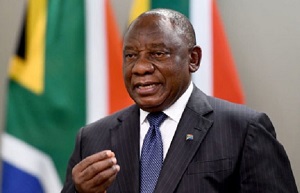by TINTSWALO BALOYI
JOHANNESBURG – NOT much has changed in Sharpeville, between the killing of 69 people by apartheid police in 1960, and now.

President Cyril Ramaphosa
Sixty-four (64) years ago, law enforcers fired on a peaceful crowd that had gathered in protest against the Pass laws in South Africa.
Today, Sharpeville, the township located between Vanderbijlpark and Vereeniging, south of Gauteng province is on the throes of poor service delivery. Local roads are littered with potholes and refuse dumps.
Like all other townships in South Africa, with an ignominious status of the world’s most unequal society, electricity and water cuts are commonplace.
“A majority of youth here are jobless and some are hooked on drugs, others to gangs,” said a community leader.
“I feel the government has abandoned our people,” he said.
Yet, the national government rolled the red carpet in the township to President Cyril Ramaphosa and other delegates on Thursday, to address the nation on the occasion of the Human Rights Day.
Several opposition parties also held events at Sharpeville to mark the day, which is commemorated yearly on March 21.
“While the political establishment and the government will use today to celebrate what it has done since 1994, we only need to walk the streets of Sharpeville, Langa and countless other abandoned communities to see that there is not much to celebrate,” said Songezo Zibi, opposition RISE Mzansi leader.
Langa, a township in the Eastern Cape, is where in 1985, also on March 21, apartheid police opened fire and killed 35 people attending a funeral of some slain activists. The commemoration had been arranged to coincide with the Sharpeville massacre.
With the holiday commemorated against the backdrop of failure by authorities to provide communities with basic human rights such as water and electricity, despair has reached rock-bottom in South Africa.
This failure to provide services is largely blamed on corruption on the ruling elite in the governing African National Congress (ANC).
Human Rights Day is anchored on South Africa’s Bill of Rights. It guarantees everyone has a right to life, equality and human dignity.
Yet in the country, murder cases are on the rise, corruption is driving inequality, while recent failure by some municipalities to provide water, including in the main metro of Johannesburg, is a threat to the dignity of citizens.
These woes add to the years of power cuts, rising unemployment and poverty in Africa’s most diversified economy.
“73 (actual number is 78) South Africans are being killed every day. There shall never be human rights until everyone is safe in South Africa,” said Mmusi Maimane, Build One South Africa leader while addressing a gathering at the Sharpeville Memorial Garden.
Sharpeville is where then President, Nelson Mandela, signed the new Constitution into law.
Ramaphosa painted a rosy picture, contrary to the prevailing socio-economic conditions in South Africa.
Notwithstanding, he had to pause his keynote speech twice because of load shedding. Generators that had been switched on as backup malfunctioned.
“We have much to celebrate,” Ramaphosa said in the address at the official commemorations, held at a stadium in Sharpeville.
Ramaphosa said since attainment of independence in 1994, millions of South Africans had been lifted out of dire poverty, 80 percent of households have proper housing, and 90 percent of homes have electricity and access to cleaning drinking water.
But most of the time electricity is at most times unavailable due to load shedding for years and water scarcity has been a headache for weeks.
There was reprieve when the power utility, Eskom, announced on Wednesday the suspension of power cuts for Thursday but that was short-lived as load shedding resumed in the evening.
Also on Thursday, there was no water across a number of areas of the impoverished Soweto, a setback Johannesburg Water blamed on faulty valves.
Rand Water, Africa’s biggest bulk water supplier, supplying the hub of Gauteng, with a population of 13 million, warned its system was on the precipice of collapse.
Some municipalities in KwaZulu-Natal and Mpumalanga provinces are also affected.
The main opposition Democratic Alliance (DA), on Human Rights Day, said it would file a South African Human Rights Commission complaint against the ANC over the escalating water crisis.
John Steenhuisen, leader of the DA, said the lack of water was in breach of the constitution.
Speaking in Mpumalanga, He described the ANC as “nothing less than a government of human rights abusers.”
“The ANC has taken away your access to electricity,” he told a gathering.
“It has taken away your access to decent healthcare. It has taken away your access to a clean environment, to a dignified life, and to the water you and your family need to survive,” Steenhuisen said.
RISE Mzansi party, one of parties newly formed ahead of the May 29 polls, also centred its message on the electricity and power woes.
“The country is in the grips of a water crisis and the current and outgoing government has no clue what to do, as is the case with the electricity crisis. They also do not care,” Zibi said.
Polling firms forecast the prevailing socio-economic challenges would cost the ANC a parliamentary majority it has enjoyed since independence. Also beset by infighting, ANC is tipped for victory but it is forecast to fall below 50 percent of the vote, for the first time since the end of apartheid.
There are already fears the right to vote could be compromised as result of the standoff between ANC and the newly-formed uMkhonto weSizwe (MK) party, a splinter group that former ANC and South Africa president, Jacob Zuma, has endorsed for the election.
ANC and MK are engaged in a legal tussle over the latter’s use of the name and logo.
Some members have threatened “civil war” if the party was disqualified.
“We must not tolerate the threats, intimidation and undemocratic actions of those who want to undermine our electoral process,” Ramaphosa said in Sharpeville.
– CAJ News




